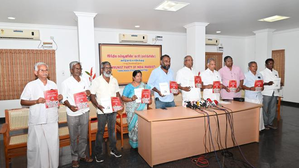Chennai: A couple of days after the CPI-M released its election manifesto in the national capital on Thursday, the party’s state secretary in Tamil Nadi, K. Balakrishnan, formally launched it here, saying the document focuses on state rights, job creation and stopping privatisation of public sector undertakings, among other things.
The manifesto promised to make agencies like the Central Bureau of Investigation, Income Tax Department, Enforcement Directorate and also institutions like the Election Commission and the Reserve Bank of India independent.
He said that the party would work towards the scrapping of the Prevention of Money Laundering Act and withdraw the amendments made to the Right to Information Act and the Lokpal Act.
It also promised to withdraw the Unlawful Activities (Prevention) Act and to release those arrested under various Acts brought in over the past 10 years of the BJP government under various new criminal laws.
The manifesto wanted to bring education back to the state list and withdrawal of the National Education Policy.
The CPI-M manifesto was for a nod to the exemption for the National Eligibility cum Entrance Test (NEET) bill passed by the state assembly. It also wants to cancel the Common University Entrance Test.
The secretary said that the party was against the post of Governor but it would urge for appointment of Governors to be made in consultation with the state governments.
The manifesto said that it would demand that the Chief Minister be the Chancellor of the state universities.
The party said it was for adequate sharing of funds with Tamil Nadu; would make employment a fundamental right and pay an assistance amount to the unemployed. It also stressed that it was for filling up the vacancies in all departments of the Central and state governments
The CPI(M) would also urge for an increase in the number of days under the Mahatma Gandhi National Rural Employment Guarantee Act from 100 to 200, and increase the daily wage to Rs 600. It wanted a similar Act for the urban areas also.
–IANS


Comments are closed.